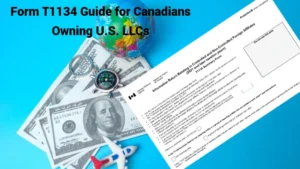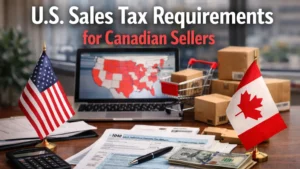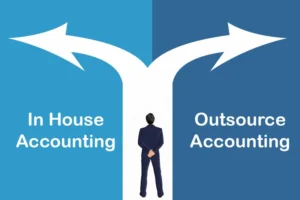Welcome to this essential guide on how to report foreign business income in Canada. If you’re a Canadian business owner with income sources outside the country, this post is for you. We’ll delve deep into the intricacies of reporting foreign income, ensuring you stay compliant with Canadian tax laws and avoid unnecessary penalties.
To report foreign business income in Canada, fill out the T1134 Form for foreign affiliates. Don’t forget to include foreign income details in your T2 Corporate Income Tax Return. Ensure compliance with CRA guidelines to avoid penalties
Table of Contents
- Why Should You Report Foreign Business Income?
- Is foreign income taxable in Canada?
- How to Determine Taxable Foreign Income in Canada?
- What is T2 Corporate Income Tax Return?
- How to Claim Foreign Tax Credits on Canadian Tax Returns?
- Which Records to Keep for Reporting Foreign Business Income in Canada?
- What are the Exemptions to Claim on Foreign Business Income in Canada?
- Conclusion
Why Should You Report Foreign Business Income?
Reporting foreign business income is vital because it’s required by tax laws. Failing to report can lead to penalties. Plus, it ensures you’re paying your fair share of taxes, helping support public services, and avoiding legal trouble down the road. Always follow tax rules!
Legal implications
According to the Canada Revenue Agency (CRA), businesses that don’t accurately report their foreign income could face penalties of up to 50% of the unreported amount. In extreme cases, criminal charges may also be filed, leading to imprisonment for up to five years.
Is foreign income taxable in Canada?
Yes, foreign income is taxable in Canada for residents. If you are a tax resident of Canada, you are required to report your worldwide income, including foreign business income, to the Canada Revenue Agency (CRA). Failing to do so can result in penalties.
In Canada, businesses that are tax-residents must report worldwide income, including foreign business income. Tax treaties and foreign tax credits can help prevent double taxation. You should be aware of the essential implications of working remotely in Canada before proceeding any further.
Tax Residency
In Canada, tax residency plays a significant role in how you report foreign income. If your business is tax-resident in Canada, you are obligated to report your worldwide income, not just the income earned within Canada.
Double Taxation
Canada has mechanisms to prevent double taxation. For example, foreign tax credits can be claimed to offset taxes paid to another country, ensuring you don’t pay taxes twice on the same income.
Types of Foreign Income
Your foreign business income in Canada can come from various sources:
Salary or Wages
If you have employees working overseas, their salaries must be reported. This includes bonuses, commissions, and fringe benefits.
Business Income
This includes profits from business activities conducted outside Canada. For example, if you have a branch or subsidiary in another country, the income generated from that entity must be reported.
Investment Income
Dividends, interest, and capital gains from foreign investments fall under this category. For instance, if you own shares in a U.S. company, the dividends received must be reported.
Other Types
Royalties from intellectual property, rental income from foreign properties, and even digital sales can be considered foreign income. For example, if you license software to a company in Germany, those royalties are foreign income.
How to Determine Taxable Foreign Income in Canada?
To determine taxable foreign income in Canada, convert your foreign earnings to Canadian dollars. You can do so by using the Bank of Canada’s annual average exchange rate. Then, include this amount in your T2 Corporate Income Tax Return.
Determining your taxable foreign income is a crucial step for Canadian businesses with international operations. Accurate calculation ensures compliance with the Canada Revenue Agency (CRA) and helps avoid penalties.
Currency Conversion
Use the Bank of Canada’s annual average exchange rate for currency conversion. This ensures uniformity in reporting and minimizes errors. For example, if you earned $10,000 USD, you would convert it to CAD using the annual average rate.
Calculating Taxable Amount
Subtract any allowable deductions like foreign tax credits or business expenses from your foreign income to arrive at the taxable amount. For example, if you paid $2,000 in foreign taxes, you could potentially claim this as a credit against your Canadian tax liability.
Exemptions and Deductions
Certain exemptions like the Foreign Earned Income Exclusion may apply, reducing your taxable income. However, these are rare and usually require specific conditions to be met.
What is the T1134 Form?
If you have foreign affiliates, you’ll need to fill out a T1134 form. This form provides details about your foreign business income in Canada.
How to Complete the T1134?
- Fill in basic information about your foreign affiliates.
- Report the income and expenses for each affiliate.
- Submit the form within 15 months after the end of your tax year to avoid penalties.
What is T2 Corporate Income Tax Return?
The T2 Corporate Income Tax Return is the tax form that corporations in Canada must file. It is used to calculate federal taxes owed. The form includes schedules for reporting different types of income, deductions, and credits.
Why should you fill out the T2 Form?
All corporations must complete the T2 form. Include Schedule 21 to report your foreign business income in Canada. Make sure to fill out all relevant sections accurately to avoid any issues later. For example, if you have foreign tax credits, these would go in Schedule 21, Line 405.
- Purpose: This form serves to provide detailed financial information about your foreign business activities, including income, expenses, and assets.
- Eligibility: Businesses with foreign affiliates that have a cost amount of more than CAD 100,000 are required to fill out this form.
- Deadline: The form must be submitted within 15 months after the end of your tax year to avoid penalties.
How to fill T2 Form?
- Use Schedule 21: Include Schedule 21 in your T2 form to specifically report foreign business income and claim foreign tax credits.
- Check Tax Rates: Verify the corporate tax rates for the tax year you are filing for, as they may change annually.
- Consult Tax Treaties: If Canada has a tax treaty with the foreign country where you earned income, consult the treaty for any tax benefits you can claim.
- Accurate Calculations: Double-check all calculations and conversions, especially when dealing with multiple currencies, to ensure accuracy.
- Documentation: Keep all supporting documents, such as invoices and bank statements, readily available in case of an audit.
- Professional Help: Given the complexities, consider hiring our cross-border tax professional familiar with international taxation to review your T2 form before submission.
- Timely Filing: Make sure to submit the T2 form within six months after the end of each tax year to avoid late filing penalties.
How to Claim Foreign Tax Credits on Canadian Tax Returns?
To claim foreign tax credits on your Canadian tax return, fill out Form T2209. Report foreign income and taxes paid, ensuring you don’t double-dip. This reduces your Canadian tax liability. Keep records and consult a tax pro if needed. File on time to avoid penalties
Tax Treaties: Canada has tax treaties with over 90 countries. These treaties can reduce or eliminate double taxation, making it financially easier to operate internationally.
For example, the tax treaty between Canada and the United States allows for a reduced withholding tax rate on dividends.
Claiming foreign tax credits on your Canadian tax returns is an essential process for businesses and individuals who have paid taxes to foreign governments. These credits can help offset your Canadian tax liability, ensuring that you’re not double-taxed on the same income. Here’s a step-by-step guide on how to claim foreign tax credits:
- Identify Eligible Taxes: Determine the taxes you’ve paid to foreign governments that are eligible for a credit. These usually include income taxes but may not cover social security contributions or other levies.
- Convert Foreign Taxes: Use the Bank of Canada’s annual average exchange rate to convert any foreign taxes paid into Canadian dollars.
- Fill Out Form T2209: Complete Form T2209, Federal Foreign Tax Credits, to calculate the amount of foreign tax credits you can claim. Attach this form to your tax return.
- Corporate Filers: If you’re a corporation, you’ll also need to complete Schedule 21 of the T2 Corporate Income Tax Return to report foreign income and claim foreign tax credits.
- Check Tax Treaties: Consult Canada’s tax treaties with the foreign country where you’ve paid taxes. Some treaties offer additional credits or exemptions.
- Documentation: Keep all records, such as foreign tax returns and payment receipts, to substantiate your claim. This is crucial in case of an audit.
- File On Time: Ensure that you file your Canadian tax return, along with Form T2209 and any other relevant schedules, by the deadline to avoid penalties.
T2209 FORM
Form T2209, also known as the Federal Foreign Tax Credits form, is a Canadian tax form used to calculate and claim foreign tax credits. This form helps Canadian residents offset taxes paid to foreign governments, reducing their Canadian tax liability on the same income.
Which Records to Keep for Reporting Foreign Business Income in Canada?
For reporting foreign business income in Canada, maintain all your documents. They include financial statements, invoices, and tax documents related to foreign transactions. Also, keep records of exchange rates used for currency conversion.
Importance of Accurate Records
Keeping accurate and comprehensive records is not just good business practice; it’s also a legal requirement. Proper record-keeping can also make it easier to prepare your tax return and provide documentation if the CRA requests it.
What to Keep
Store invoices, bank statements, and tax documents for at least six years to comply with CRA guidelines. This should include any forms or receipts related to foreign tax payments.
Why to Keep
- Identify Income Sources: Helps in identifying various sources of income and deciding whether to charge GST/HST.
- Tax Savings: Good records remind you of deductible expenses and Input Tax Credits (ITCs), potentially saving you money on taxes.
- Audit Preparedness: Complete records are essential if audited, as they can validate your income and tax claims, saving you time and potential penalties.
- Financial Insight: Records provide valuable information about your business’s financial position, helping in profit/loss calculation and business valuation.
- Business Analysis: Good records can reveal business trends, allow year-to-year performance comparison, and aid in budgeting and forecasting.
Common Mistakes to Avoid
- Not using the correct exchange rate for currency conversion.
- Failing to declare all types of foreign income.
- Incorrectly calculating deductions or claiming ineligible deductions.
Failing to Report Foreign Business Income in Canada
Failing to report foreign business income in Canada can result in severe penalties, including fines of up to 50% of the unreported income. In extreme cases, criminal charges may lead to imprisonment.
- Penalties: Failure to report can result in severe penalties, including fines of up to 50% of the unreported amount. Penalties apply if you fail to report $500 or more on your tax returns for specific years (2019 to 2022). The penalty is either 10% of the unreported amount or 50% of the understated tax or overstated credits, whichever is less.
- Penalty relief: It may be granted if you voluntarily disclose unreported amounts or overstated credits before the CRA contacts you or related parties.
- Legal Consequences: In extreme cases, criminal charges may be filed, leading to imprisonment for up to five years.
- Reputation: Non-compliance can also harm your business reputation and may trigger a more in-depth audit by the CRA.
What are the Exemptions to Claim on Foreign Business Income in Canada?
You can use foreign tax credits to lower Canadian taxes paid to other countries and deduct work-related costs for earning income abroad. This helps reduce your Canadian tax bill. Keep records and meet deadlines to avoid penalties.
Zero-Rated or Exempt Supplies:
Zero-rated or exempt supplies are goods or services that are not subject to GST/HST. This could include certain exports, medical devices, or educational services.
Documentation:
It’s crucial to keep invoices, contracts, and any other documentation that proves the nature of these supplies.
Claiming Exemptions:
When filing your tax return, you’ll need to provide this documentation to claim exemptions on these supplies. Failure to do so could result in penalties or disallowed claims.
Review Regulations:
Always stay updated on what qualifies as zero-rated or exempt under Canadian tax law, as regulations can change.
Foreign Earned Income Exclusion:
Foreign Earned Income Exclusion is a U.S. tax provision that allows U.S. citizens or residents to exclude a certain amount of foreign-earned income from their U.S. taxable income. While this is more common in the U.S., similar provisions may exist in certain tax treaties between Canada and other countries.
Eligibility:
This exclusion is generally not available for Canadian businesses or residents for Canadian tax purposes. However, if you are a U.S. citizen residing in Canada, you may be eligible for this exclusion on your U.S. tax return.
Conditions:
To qualify, you usually need to meet specific conditions such as a physical presence test or bona fide residence test. The income must also be earned income, not passive income like dividends or interest.
Limitations:
There is often a cap on the amount of income that can be excluded, and this exclusion cannot be used to offset Canadian taxes unless specified in a tax treaty.
Documentation:
If you believe you qualify for a similar exclusion under a tax treaty, you’ll need to maintain detailed records of your foreign income, as well as any foreign taxes paid, to substantiate your claim.
Conclusion
Reporting foreign business income in Canada can be complex but is crucial for legal compliance and accurate taxation. Consult our cross-border tax professional to ensure you’re meeting all requirements and taking advantage of any tax-saving opportunities.






